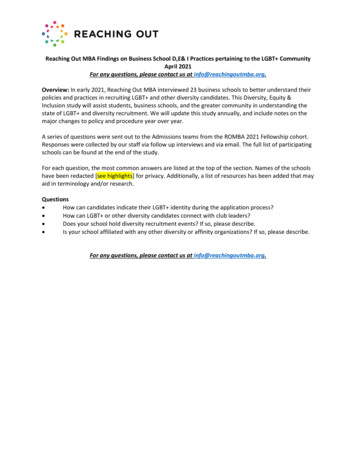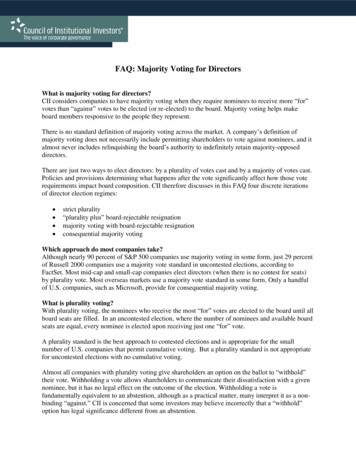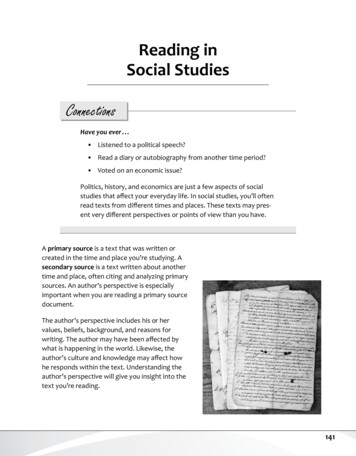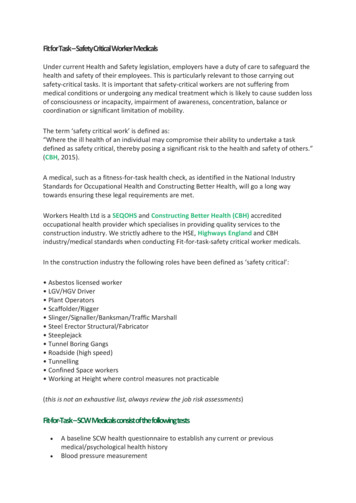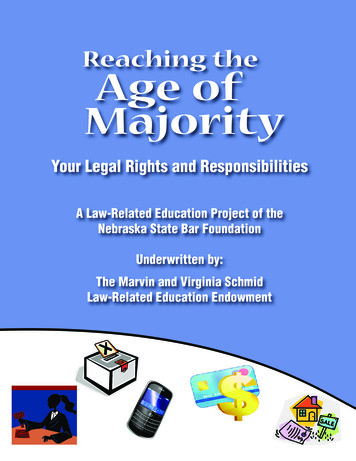
Transcription
Reaching theAge ofMajorityYour Legal Rights and ResponsibilitiesA Law-Related Education Project of theNebraska State Bar FoundationUnderwritten by:The Marvin and Virginia SchmidLaw-Related Education Endowment
AC K N OW L E D G M E N T SThe Nebraska State Bar Foundation would like to acknowledge the generous financial support ofPast President Marvin Schmid and his wife, Virginia, through their substantial underwritingof the Age of Majority Booklet.“I became interested in the Nebraska State Bar Foundation when Tom Davies wasPresident and he asked me to be a candidate for vice president.Tom held theview that both the membership and contributions should be enlarged and he seta course to implement this view.This (Roman L. Hruska Law Center) truly wasthe catalyst for the program upon which today’s highly respected and successfulFoundation was built. What the Foundation is today is a happy and persuasiveillustration of what can be done by members of the Bar Foundation.in pursuitof meritorious programs under dedicated, able, imaginative leadership.I am proud to be a member of the Bar Foundation.”As quoted byMarvin G. Schmid, President (1977-1979)In September 1998The Marvin and Virginia Schmid Law-Related Education Endowmentsupports teaching Nebraska youth their rights and responsibilitiesas they enter the Age of Majority.The Bar Foundation is the designated Nebraska Center for Law-Related Education (LRE) for thePublic and serves thousands of our state’s citizens through its LRE programs. In 2003, the Foundationbegan its Legacy of Liberty program to promote and create support for LRE. Virginia Schmid is amember of the Legacy of Liberty Stars and Stripes Society. Some of the programs include the StateHigh School Mock Trial Project, Reaching the Age of Majority booklet, the ABA award-winning Law DayEssay Contest for 7th though 12th graders, Law Day Job Shadowing for fifth graders,We the People: The Citizen and the Constitution, Constitution Day, Teen Parents and the Law (TPAL),PEOPLE committee, and You the Juror Orientation video.Reaching the Age of Majority is an incredible resource to benefit families and schools while educatingNebraska youth. The booklet can be used to begin a discussion on the effects of your credit, landlordtenant laws or the laws surrounding technology, etciiREACHING THE AGE OF MAJORITY
AC K N OW L E D G M E N T SThe Nebraska State Bar Foundation is pleased to publish the booklet, Reaching the Age of Majority, forNebraska’s young adults. The Foundation is a charitable education organization committed to improving the administration of justice as noted in its Mission Statement.Mission StatementTo serve the citizens of Nebraska and the legal profession through administration and funding of innovative and creative programs directed toward the improvement of the administration of justice and thefulfillment of the American vision of equal justice for all.This booklet has been reviewed by the following:L. Jay Bartel, LincolnChristopher D. Burge, OmahaDebora D. Brownyard, LincolnMark A. Christensen, LincolnAlan L. Everett, LincolnMarsha E. Fangmeyer, KearneyDr. Tammie J. Fischer, LincolnBrad Gianakos, LincolnMary Kay Hansen, LincolnScott P. Helvie, LincolnDoris J. Huffman, LincolnJohn C. Hurd, LincolnPeggy J. Jasa, LincolnJill G. Jensen, LincolnThomas E. Keefe, LincolnGary E. Lacey, LincolnCindy Lilleoien, LincolnJohn H. Marsh, KearneyCindy McGroarty, LincolnLarry D. Ohs, LincolnMarc W. Pearce, LincolnKeith T. Peters, LincolnKevin L. Ruser, LincolnHon. Richard D. Sievers, LincolnNancy A. Svoboda, OmahaDalton W. Tietjen, LincolnMargene M. Timm, LincolnVerna Weber, LincolnRobin Hadfield, Lincoln – EditorThe Nebraska State Bar Foundation gratefully acknowledges the outstanding efforts of Marc W.Pearce and Keith T. Peters who served as co-chairs of the Reaching the Age of Majority revision.The original edition of the Reaching the Age of Majority booklet was printed in 1994. This booklet hasrecently been reviewed and updated to reflect Nebraska’s current law and policy. Approximately100,000 copies have been distributed to high school seniors to help them understand their rights andresponsibilities. The section on credit comes from a publication entitled Consumer Handbook to CreditProtection Laws, published by the Board of Governors of the Federal Reserve System.First Printing: 1994/Revised: March 1999/Revised: September 2001/Revised: August 2003/Revised: August 2004/Revised: February 2006/Revised: February 2010/Revised: April 2011YOUR RIGHTS AND RESPONSIBILITIESiii
N E B R A S K A S TAT E B A R F O U N DAT I O NHistoryA vision of establishing a futuristic organization was realized by seven men on November 20, 1963. TheNebraska State Bar Foundation was incorporated as a 501(c) (3) charitable and educational organization to serve as the philanthropic arm of Nebraska’s legal profession. The Bar Foundation continues togive back to the legal profession and the general community to benefit the citizens of Nebraska. TheFoundation’s goals are complemented by its Law-Related Education projects.Foundation Goals Advance the science of jurisprudence; Promote and improve the administration of justice; Uphold high standards for the judiciary and lawyers; Facilitate understanding of and compliance with the law; promote study of the law, research and diffusion of knowledge thereof; Publish and distribute addresses, reports, treatises and other literary works on legal subjects, and acquire, preserve, and exhibit rare books and documents, objects of art, and items of historical interesthaving legal significance or bearing on the administration of justice; Aid the charitable and welfare purpose of Nebraska lawyers in active practice and their families throughthe relief of the poverty of such lawyers and their families; and Provide for, furnish or manage any building, lands or grounds relative to the administration of justiceand the improvement of the service rendered to the public by the judiciary. Do and perform all acts and things that are legitimate and are reasonably calculated to promote theinterest and carry out the purposes of this organization.Many lawyers, judges and interested people generously provide financial support to the Bar Foundation,and this backing enables the Foundation to fund a variety of Law-Related Education programs and projects. The support is derived from the Foundation’s Fellows Program, Memorial Program, and Legacy ofLiberty program. Members who voluntarily give Contributing Dues ( 25), Sustaining Dues ( 75), or Enhanced Fellow Dues ( 100) generate another source of revenue. Additionally, a Planned Giving Programhas been developed to ensure that the Foundation’s purpose will be carried out in the future. All levels ofgiving are essential for the Foundation to completely fulfill its mission and to underwrite worthy Law-Related Education projects and programs. The Foundation is a 501(c) (3) corporation, and donors receivea tax deduction on all gifts as allowed by law.Nebraska State Bar Foundation635 South 14th Street, P.O. Box 95103 Lincoln, NE 68509-5103Phone (402) 475-1042 Fax (402) 475-7106Doris Huffman, Executive Directorwww.nebarfnd.orgE-Mail doris@nebarfnd.orgivREACHING THE AGE OF MAJORITY
I N T RO D U C T I O NMany high school graduates will soon pass from being a minor to an adult. In Nebraska, you are considered an adult for most purposes when you reach the age of 19. You will find that you have many legal rightsand responsibilities when you reach 19 years of age. However, there are also some rights and responsibilities that you will want to be aware of when you turn 18.The booklet is not intended to serve as legal advice, but rather to inform you of rights and responsibilities. It was not possible to cover every area of the law you may encounter. If you have specific questions on the subjects covered in this publication, you can refer to the Resource section of the bookletor contact an attorney.What are some of the rights at age 18? Applying for credit in your own name Filing a lawsuit Making a will Voting Making a contract (rent an apartment, buy a car, take out a loan) in your own name Becoming personally responsible for the obligations of contracts you make Making health care decisionsWhat are some of the responsibilities at age 19? Becoming eligible for jury duty Becoming legally independent from parental control Becoming self-supporting (parents are no longer required to support you)YOUR RIGHTS AND RESPONSIBILITIESv
TA B L E O F C O N T E N T SAlcohol . . . . . . . . . . . . . . . . . . . . . . . . . . . . . . . . . . . . . . . . . . . . . . . . . . . . . . . . . . . . . . . . . . . . . . . . . . . . . . . . . . . . . . . . . . . . .1Alternative Dispute Resolution . . . . . . . . . . . . . . . . . . . . . . . . . . . . . . . . . . . . . . . . . . . . . . . . . . . . . . . . . . . . . . . . . . . . . . . .2Banking . . . . . . . . . . . . . . . . . . . . . . . . . . . . . . . . . . . . . . . . . . . . . . . . . . . . . . . . . . . . . . . . . . . . . . . . . . . . . . . . . . . . . . . . . . . . .3Cell Phones . . . . . . . . . . . . . . . . . . . . . . . . . . . . . . . . . . . . . . . . . . . . . . . . . . . . . . . . . . . . . . . . . . . . . . . . . . . . . . . . . . . . . . . . .4Consumer Protection . . . . . . . . . . . . . . . . . . . . . . . . . . . . . . . . . . . . . . . . . . . . . . . . . . . . . . . . . . . . . . . . . . . . . . . . . . . . . . . .4Contracts . . . . . . . . . . . . . . . . . . . . . . . . . . . . . . . . . . . . . . . . . . . . . . . . . . . . . . . . . . . . . . . . . . . . . . . . . . . . . . . . . . . . . . . . . . .6Credit . . . . . . . . . . . . . . . . . . . . . . . . . . . . . . . . . . . . . . . . . . . . . . . . . . . . . . . . . . . . . . . . . . . . . . . . . . . . . . . . . . . . . . . . . . . . . .7Crime Victims . . . . . . . . . . . . . . . . . . . . . . . . . . . . . . . . . . . . . . . . . . . . . . . . . . . . . . . . . . . . . . . . . . . . . . . . . . . . . . . . . . . . . . .9Criminal Law . . . . . . . . . . . . . . . . . . . . . . . . . . . . . . . . . . . . . . . . . . . . . . . . . . . . . . . . . . . . . . . . . . . . . . . . . . . . . . . . . . . . . . .10Domestic Abuse . . . . . . . . . . . . . . . . . . . . . . . . . . . . . . . . . . . . . . . . . . . . . . . . . . . . . . . . . . . . . . . . . . . . . . . . . . . . . . . . . . . .11Drugs, Narcotics, Tobacco, and Alcohol . . . . . . . . . . . . . . . . . . . . . . . . . . . . . . . . . . . . . . . . . . . . . . . . . . . . . . . . . . . . . . .12Employment Law . . . . . . . . . . . . . . . . . . . . . . . . . . . . . . . . . . . . . . . . . . . . . . . . . . . . . . . . . . . . . . . . . . . . . . . . . . . . . . . . . . .12Grand Juries . . . . . . . . . . . . . . . . . . . . . . . . . . . . . . . . . . . . . . . . . . . . . . . . . . . . . . . . . . . . . . . . . . . . . . . . . . . . . . . . . . . . . . .14Health and Human Services . . . . . . . . . . . . . . . . . . . . . . . . . . . . . . . . . . . . . . . . . . . . . . . . . . . . . . . . . . . . . . . . . . . . . . . . .14Hunting and Fishing . . . . . . . . . . . . . . . . . . . . . . . . . . . . . . . . . . . . . . . . . . . . . . . . . . . . . . . . . . . . . . . . . . . . . . . . . . . . . . . . .16Immigration . . . . . . . . . . . . . . . . . . . . . . . . . . . . . . . . . . . . . . . . . . . . . . . . . . . . . . . . . . . . . . . . . . . . . . . . . . . . . . . . . . . . . . . .17Impeachment of Public Officials . . . . . . . . . . . . . . . . . . . . . . . . . . . . . . . . . . . . . . . . . . . . . . . . . . . . . . . . . . . . . . . . . . . . . .19Insurance . . . . . . . . . . . . . . . . . . . . . . . . . . . . . . . . . . . . . . . . . . . . . . . . . . . . . . . . . . . . . . . . . . . . . . . . . . . . . . . . . . . . . . . . . .19Internet Safety . . . . . . . . . . . . . . . . . . . . . . . . . . . . . . . . . . . . . . . . . . . . . . . . . . . . . . . . . . . . . . . . . . . . . . . . . . . . . . . . . . . . .21Jury Duty—State Courts . . . . . . . . . . . . . . . . . . . . . . . . . . . . . . . . . . . . . . . . . . . . . . . . . . . . . . . . . . . . . . . . . . . . . . . . . . . .23Landlord-Tenant Law . . . . . . . . . . . . . . . . . . . . . . . . . . . . . . . . . . . . . . . . . . . . . . . . . . . . . . . . . . . . . . . . . . . . . . . . . . . . . . . .23Marriage, Divorce and Children . . . . . . . . . . . . . . . . . . . . . . . . . . . . . . . . . . . . . . . . . . . . . . . . . . . . . . . . . . . . . . . . . . . . . .24Minors and Medical Treatment . . . . . . . . . . . . . . . . . . . . . . . . . . . . . . . . . . . . . . . . . . . . . . . . . . . . . . . . . . . . . . . . . . . . . .25Parties . . . . . . . . . . . . . . . . . . . . . . . . . . . . . . . . . . . . . . . . . . . . . . . . . . . . . . . . . . . . . . . . . . . . . . . . . . . . . . . . . . . . . . . . . . . .25Pets . . . . . . . . . . . . . . . . . . . . . . . . . . . . . . . . . . . . . . . . . . . . . . . . . . . . . . . . . . . . . . . . . . . . . . . . . . . . . . . . . . . . . . . . . . . . . .25Search and Seizure . . . . . . . . . . . . . . . . . . . . . . . . . . . . . . . . . . . . . . . . . . . . . . . . . . . . . . . . . . . . . . . . . . . . . . . . . . . . . . . . .27Sex Crimes . . . . . . . . . . . . . . . . . . . . . . . . . . . . . . . . . . . . . . . . . . . . . . . . . . . . . . . . . . . . . . . . . . . . . . . . . . . . . . . . . . . . . . . .28Sexting . . . . . . . . . . . . . . . . . . . . . . . . . . . . . . . . . . . . . . . . . . . . . . . . . . . . . . . . . . . . . . . . . . . . . . . . . . . . . . . . . . . . . . . . . . . .29Tax Responsibilities . . . . . . . . . . . . . . . . . . . . . . . . . . . . . . . . . . . . . . . . . . . . . . . . . . . . . . . . . . . . . . . . . . . . . . . . . . . . . . . . .30Technology . . . . . . . . . . . . . . . . . . . . . . . . . . . . . . . . . . . . . . . . . . . . . . . . . . . . . . . . . . . . . . . . . . . . . . . . . . . . . . . . . . . . . . . .32The Selective Service System and Military Service . . . . . . . . . . . . . . . . . . . . . . . . . . . . . . . . . . . . . . . . . . . . . . . . . . . . .33Torts . . . . . . . . . . . . . . . . . . . . . . . . . . . . . . . . . . . . . . . . . . . . . . . . . . . . . . . . . . . . . . . . . . . . . . . . . . . . . . . . . . . . . . . . . . . . . .33Transportation . . . . . . . . . . . . . . . . . . . . . . . . . . . . . . . . . . . . . . . . . . . . . . . . . . . . . . . . . . . . . . . . . . . . . . . . . . . . . . . . . . . . .34Voting . . . . . . . . . . . . . . . . . . . . . . . . . . . . . . . . . . . . . . . . . . . . . . . . . . . . . . . . . . . . . . . . . . . . . . . . . . . . . . . . . . . . . . . . . . . . .35Water Sports . . . . . . . . . . . . . . . . . . . . . . . . . . . . . . . . . . . . . . . . . . . . . . . . . . . . . . . . . . . . . . . . . . . . . . . . . . . . . . . . . . . . . .35Weapons, Guns & Fireworks . . . . . . . . . . . . . . . . . . . . . . . . . . . . . . . . . . . . . . . . . . . . . . . . . . . . . . . . . . . . . . . . . . . . . . . .36Wills, Power of Attorney, and Living Wills . . . . . . . . . . . . . . . . . . . . . . . . . . . . . . . . . . . . . . . . . . . . . . . . . . . . . . . . . . . . .37Resources and Elected Officials . . . . . . . . . . . . . . . . . . . . . . . . . . . . . . . . . . . . . . . . . . . . . . . . . . . . . . . . . . . . . . . . . . . . .38Order Form . . . . . . . . . . . . . . . . . . . . . . . . . . . . . . . . . . . . . . . . . . . . . . . . . . . . . . . . . . . . . . . . . . . . . . . . . . . . . . . . . . . . . . . .40viREACHING THE AGE OF MAJORITY
ALCOHOLWhat is the legal drinking age in Nebraska?You must be 21 years of age to drink alcoholic beveragesin the State of Nebraska.What is DUI and what are the penalties for it?In Nebraska, it is illegal to operate or be in control of amotor vehicle while under the influence of alcohol or drugs,and any person discovered to be doing so will be cited forDUI (driving under the influence).DUI carries enhanced penalties for each succeeding offense:1st OffenseLicense RevocationFineJail TimeIf Placed on Probation(revocation / fine / jailor community service)Does Nebraska law say anything about blood alcoholconcentration for minors while driving?In addition to the criminal offenses already explained, if youare under 21 years of age and found to have a blood alco-2nd OffenseBAC .086 months 400-5007 to 60 daysBAC .151 year 400-5007 to 60 daysBAC .081 year 50030 days to 6 monthsBAC .151 to 15 yearsup to 1,00090 days to 1 year60 days / 4001 year / 500 /2 days jail or200 hours cs1 year / 500 /10 days jail or240 hours cs1-15 years / 1000 /30 days jail4th OffenseLicense RevocationFineJail TimeIf Placed on Probation(revocation / fine / jailor community service)DMV for information on how to apply for a work permit andthe costs involved. A work permit may be used to commuteback and forth to work only and so long as you are not suspended by the court.Upon conviction for DUI, you will be given credit for anytime you have served under the ALR suspension, even if awork permit has been issued.BAC .0815 yearsup to 10,000180 days to 5 years15 years / 1,000 /90 days jailBAC .1515 yearsup to 25,0001 to 20 years15 years / 1,000 /120 days jail5th OffenseBAC .08BAC .1515 years15 yearsup to 25,000N/A1 to 20 years1 to 50 years15 years / 1,000 / 15 years / 1,000 /180 days jail180 days jailWhat is the ALR (Administrative LicenseRevocation) procedure?An ALR suspension is distinct and separate from any suspension imposed by a court. When stopped by a law enforcement officer for suspicion of DUI, your license may besuspended by the Department of Motor Vehicles (DMV)for a period of 90 days.This suspension begins 30 days from the arrest date. Asubsequent ALR suspension carries a one-year license suspension.You may apply for a probable cause hearing with theDMV within 10 days from the date of arrest. All informationregarding this procedure is listed on the back side of thetemporary license given to you. The director of the DMV isresponsible for determining if probable cause existed forthe stop based on testimony from the arresting officer,you, and any other witnesses who provide testimony. If theDMV finds probable cause did not exist, your license willbe returned and the ALR suspension will not be in effect.You may apply for a work permit 30 days after your license is revoked. However, you may not qualify for a workpermit if this is a second ALR suspension. Contact the3rd OffenseBAC .0815 years 60090 days to 1 year2-15 years / 600 /30 days jailBAC .1515 yearsup to 10,000180 days to 5 years5-15 years / 1000 /60 days jailNote: BAC Blood Alcohol ContentNote: CS Community ServiceIf a person refuses to be tested, the penaltiesfor a BAC .15 will apply.In some cases, the court may also orderimmobilization of a vehicle, installation of anignition interlock device or an alcoholmonitoring device.hol concentration over .02, you can lose your license for30 days on a first offense.When is a minor considered to be in possession ofliquor or beer?A minor may not sell, dispense, consume, or have in his orher possession or physical control any alcoholic liquor. Thisincludes situations where a minor’s blood alcohol concentration is greater than .02. If a minor is found to be in possession of alcohol, he or she may be punished with up tothree months imprisonment and/or a 500 fine.Are there situations where an underage person maylegally have contact with liquor or beer?Yes, Nebraska has several exceptions: You may have contact with alcohol before your 21stbirthday when the alcohol is part of a bona fide (authentic) religious celebration. If you are at least 16 years old and accompanied by anon-minor, you may carry out beer and liquor from anestablishment. If you are a minor at least 16 years old and it is within theYOUR RIGHTS AND RESPONSIBILITIES1
A L C O H O L ( c o n t i nu e d )course of your employment, you may handle, remove,dispose of, or stock alcohol beverage bottles. If you are at least 19 years old, you may serve and sellliquor if it is within the course of your employment. Also, you may consume or possess alcohol within yourpermanent place of residence.If you are underage, can you be in an establishmentthat serves alcohol?There are currently no state laws or regulations restricting the age of a person permitted in businesses that servealcohol. However, it is important to be aware that theremay be local laws that restrict such activity.What are some additional ways a minor can violateNebraska's drinking laws? Misrepresenting your age in an effort to obtain alcoholis punishable up to three months imprisonment and/ora 500 fine. Also, creating or altering any form of identification thatmay be used to establish age for purposes of purchas-ing alcohol is punishable up to one year imprisonmentand/or a 1000 fine. When a minor is charged with either of these crimes,the police officer is required to make a reasonable attempt to notify the minor’s parent or guardian of the arrest. It is also illegal for a person of any age to have an opencontainer of alcohol in a vehicle while on a public highwayor parking area. In addition, cities and counties are allowed to pass andenforce local laws to control the consumption and possession of alcohol by minors.Are there laws about tobacco like those for alcohol?Nebraska makes it a crime for you to use tobacco (in itsvarious forms) if you are under 18 years of age or to misrepresent your age to obtain tobacco. In either situation,the possible penalty is a fine of up to 100 for the minorusing or buying the tobacco and up to three months in jailand/or a 500 fine for the person selling to the minor.A LT E R N AT I V E D I S P U T E R E S O L U T I O NWhat is Alternative Dispute Resolution (ADR)?People who are having a conflict with others sometimesgo to court to try to have a judge solve the problem. However, going to court, also called “litigation,” can be time consuming, costly, and doesn’t always solve the underlyingproblem between the people themselves.Alternative dispute resolution (ADR) is a term used foralternative ways to handle conflict outside of court that areoften less stressful, less costly, and more convenient. Onecommon ADR approach is called “mediation.” In mediation,a neutral mediator meets with each person in the conflictto learn about the problem and how it affects the person.The mediator helps each person identify possible solutions.The mediator helps the people decide whether to meetface-to-face in a safe place to talk through the problem.The mediator then listens, asks questions, and assistseach person to come up with possible solutions. The mediator, unlike a judge, does not tell people what to do anddoes not impose a decision. Rather, the decision to agreeor disagree, to apologize or not, is entirely up to each person in the mediation. If the people want the mediator tohelp them write up an agreement, that can be done.While some court cases use mediators, mediation isalso often used before a court case is filed. Individuals, family members, co-workers, or neighbors can call a media2REACHING THE AGE OF MAJORITYtion center or a mediator to ask for help early on – way before a conflict has to go to court. Some schools havetaught students to be peer mediators who help classmates resolve disputes. The list of Nebraska’s approvedmediation centers can be found at this er-locations.shtml?sub7Other types of ADR include negotiation, arbitration, andfacilitated rule making. Those are described below.What is the Nebraska Office of Dispute Resolution?The Nebraska Office of Dispute Resolution (ODR) is part ofthe Administrative Office of the Nebraska Supreme Court.Its purpose is to oversee the development of dispute resolution, with a focus on non-profit mediation centers andcourt-connected programs. There are six regional mediation centers approved by ODR and a few programs established by local courts. There are also a number ofindependent mediators and arbitrators located throughout the state.What are some examples of the ADR process and howthey might be used? Negotiation. One-to-one discussion. People in conflictthemselves discuss issues and their needs in an effort
A LT E R N AT I V E D I S P U T E R E S O L U T I O N ( c o n t i nu e d )to resolve a disagreement. For example, a tenant andlandlord might discuss issues about repairing damageto see if those issues can be resolved. Sometimes people have advocates to help them negotiate. Examples ofpeople who may serve as advocates include attorneys,consumer advocates such as the Better Business Bureau, or advocates for particular groups such as theHispanic Center. Mediation. Mediation has been described briefly above.In mediation, people use help from a neutral person toengage in discussions to explore their interests andneeds in an effort to reach an agreement. The neutralperson helps the people communicate and guides themthrough the problem-solving process but does not makedecisions for them. One example would be when divorcing parents ask a mediator to help them develop ashared parenting plan after the divorce. Another example would be a dissatisfied customer and a businessasking a mediator to help them resolve the dispute.There are several different types of mediators, and youwill want to choose one whose style fits your needs. Mediator styles include facilitative, evaluative and transformative. The facilitative-style mediator provides aprocess where parties can discuss the problem andwork together toward an agreement. Based on his orher own experience, an evaluative mediator assists theparties to evaluate the strengths and weaknesses oftheir case and encourages parties to settle, oftenthrough the use of private meetings or “shuttle diplomacy.” A mediator in the transformative style will makeobservations about the way in which the disputants arecommunicating and help them feel empowered to solvethe conflict and to recognize the “humanness” of theother party. Public Policy Facilitation. A neutral facilitator helps agroup solve problems by controlling the flow of discussions, setting a constructive tone, and helping the groupfocus on important items. This is sometimes referred toas Negotiated Rule Making. An example is when a government agency asks members of the public to participate in making policy decisions such as “how shouldunderground storage tanks at gas stations be regulated?” Arbitration. Arbitration is a semi-formal process of dispute resolution in which a neutral person is selected todecide the outcome for the parties. The parties may decide beforehand whether the arbitrator’s decision willbe binding (enforceable) or non-binding (advisory). Parties are often represented by attorneys. An examplewould be when a person with insurance and an insurance company disagree about whether some expensesare covered by an insurance policy and ask an arbitrator to decide the issue.Who are the mediators, facilitators and arbitrators?Mediators and facilitators come from a wide range of backgrounds and professions.They are located in every region of the state. Some arevolunteers, and some are paid. Most mediators take atleast 30 hours of training approved by the Office of Dispute Resolution. There is also an apprentice period wherethey practice with more experienced mediators and facilitators. Mediators are often affiliated with one of the sixODR-approved mediation centers. There are also independent mediators and mediators who work in count-connected programs.Arbitrators are often attorneys or retired judges. Theymust have a great deal of experience with the subject ofthe dispute and often specialize, arbitrating only certaintypes of cases. Arbitrators are often members of organizations like the American Arbitration Association (AAA) orthe Association for Conflict Resolution (ACR).BANKINGMay I open a bank account?Yes. Under Nebraska law, persons of all ages may have abank account. However, individual banks may have age restrictions on opening certain accounts at their bank.What things should one consider before opening abank account? What is the minimum balance on the account? What is the interest rate of the account? Is there a monthly service charge on the account? What are the fees for ATM and check usage?What happens when a check bounces?A person who writes a bad check knowing that he or shedoes not have sufficient funds in or credit with the bank forpayment commits the offense of issuing a bad check. Issuing a bad check is classified as a misdemeanor or afelony depending on the amount of the check. A personmay also be ordered to make restitution and pay any reasonable handling fee and 10. Neb. Rev. Stat. § 28-611.YOUR RIGHTS AND RESPONSIBILITIES3
CELL PHONESAre there any laws concerning cell phones?It is illegal to use a cell phone or other wireless device totext while a motor vehicle is in motion. The violation resultsin fines and points on a driver’s license. Using a cell phoneis a great way to keep in touch with your family and friends,but you must follow a few safety and etiquette rules to bea good cell phone citizen.The following tips may be useful: Do not dial, text, or talk while driving. In Nebraska, it is illegal for any person with a POP license, learner’s permit, or school permit to drive while using a cell phone.While it is not illegal in Nebraska for a person with an operator’s license to use a cell phone while driving, it isvery dangerous and is illegal in some states. Keep calls short and avoid talking too loud in public. Refrain from talking on your phone as a courtesy inplaces such as churches, restaurants, movie theaters,and anywhere else where it would be a nuisance. It maybe n
The Bar Foundation is the designated Nebraska Center for Law-Related Education (LRE) for the Public and serves thousands of our state's citizens through its LRE programs. In 2003, the Foundation began its Legacy of Liberty program to promote and create support for LRE. Virginia Schmid is a member of the Legacy of Liberty Stars and Stripes .




